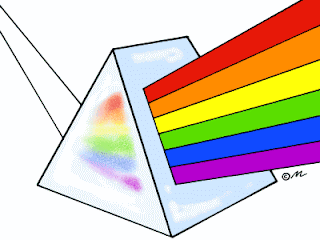Vocabulary #2
2-Spectrum: A band of colors produced when light goes through a prism.
3- Primary Color: Red, green, or blue; mixing these colors can produce all the colors of the spectrum.
4-Primary Pigment: Magenta, cyan, yellow; material with any of these colors absorbs one primary color or light and reflects the other two.
Vocabulary #4
1-Electromagnetism: The production of magnetism by electricity and the production electricy by magnets.
2- Electromagnetic Spectrum: All the wavelengths of visible and invisible light in order from short (gamma rays) to long (radio).
3- Laser: A device that produces a thin stream of light of just a few close wavelengths.
Vocabulary #5
1-Mass: The amount of matter in an object.
2-Volume:The amount of space an object take up.
3-Weight: (on Earth) a measure of the force of gravity between Earth and an object.
4-Density: A measure of how tightly packed matter is; the amount of mass contained in a given volume.
5-Buoyancy: The upward push on an object by the liquid (or gas) the object is placed in.
6-Conduct: Allow heat or electricity to flow through readily.
7-Insulate: Not allow heat or electricity to flow through readily.
Vocabulary # 6
1-Element: A basic building block of matter; a pure substance that cannot be broken down into anything simpler.
2-Compound: A chemical combination of two or more elements into a single substance.
3- Atom: The smallest unit of an element that still has the properties of the element.
4-Proton: A particle with a positive charge in the nucleus of an atom.
5-Neutron: An uncharged particle in the nucleus of an atom.
6-Electron: A particle with a negative charge moving around the nucleus of an atom.
7-Nucleus: The dense center part of an atom.
8-Molecule: A group of more than one atom joined together that acts like a single particle.
Vocabulary # 7
1-Mixture:Two or more parts blended together yet keeping their own properties and not turning into a new substance.
2- Solution: A mixture in which substances are completely blended so that the properties are the same throughout and the substances stay blended.
3-Suspension: A mixture of substances that separate upon standing.
4-Colloid: Particles (or droplets) large enough to block out light spread throughout another substance.
5-Emulsion: A liquid spread through another liquid.
6-Aerosol: Liquid drops or solid particles spread through a gas.
7- Gel: A solid spread through a liquid.
8- Foam: A gas spread through a liquid or solid.
Vocabulary # 8
1-Physical Change: A change in size, shape, or state, without forming a new substance.
2- Chemical Change: A charge in matter that produces a new substance with different properties from the original.
3-Chemical Reaction: A chemical change of original substances into one or more new substances.
4-Reactant: One of the original substances before a chemical reaction takes place.
5-Product: One of the new substances produced when a chemical reaction takes place.
Vocabulary # 9
1-Kinetic Energy: The energy of a moving object.
2-Potential Energy: Energy stored in a object or material.
3-Conduction: Movement of energy from a hot object that comes into contact with a cooler object; the material remains in place.
4-Convection: Movement of energy by the flow of matter from place to place.
5-Radiation: Movement of energy in the form of waves that can travel through empty space.
6-Wet Cell Battery: A battery containing liquid solution that produces the electric current.
7-Dry Cell Battery: A battery that uses "dry chemicals" to produce an electric current.
Vocabulary # 10
1-Solar System: The Sun and the objects that are traveling around it.
2-Planet: Any of the nine large bodies that travel around the Sun and shine by reflecting its light.
3-Gravity: A force or attraction, or pull, between any object and any other objects around it.
4-Inertia: The tendency of a moving object to keep moving in a straight line.
5-Lithosphere: The hard, outer layer of Earth, about 100 kilometers thick.
6-Crust: The rocky surface that makes up the top of the lithosphere.
7-Resource: Any material that helps support life on Earth.
7- Hydrosphere: Earth's water.
Vocabulary # 11
1-Fault: A crack in the crust, whose sides show evidence of motion
2-Geologist: A scientist who studies Earth.
3-Magma: Hot, molten rock deep below Earth's surface.
4-Lava: Magma that reaches Earth's surface.
5- Weathering: The breaking down of rocks into smaller pieces.
6-Erosion: The picking up and carrying away of pieces of rock.
7-Deposition: The dropping off of bits of eroded rock.
8-Meteorite: A chunk of rock from space that strikes a surface (such as Earth or the Moon).
Vocabulary # 12
1-Mineral: A solid material of Earth´s crust with a definite composition.
2-Luster: The way light bounces off a mineral's surface.
3-Streak: The color of the powder left when a mineral is rubbed against a hard, rough surface.
4-Hardness: How well a mineral resists scratching.
5-Cleavage: The tendency of a mineral to break along flat surfaces.
8-Nonrenewable Resource: A resource that cannot be replaced within a short period of time or at all.
Vocabulary # 13
1-Rock: A naturally formed solid in the crust, made up of one or more minerals.
2-Ingeneous Rock: A rock formed when melted rock material cools and hardens.
3-Sedimentary Rock: A rock made of bits of matter joined together.
4-Fossil: Any remains or imprint of living things of the past.
5-Metamorphic Rock: A rock formed under heat and pressure from another kind of rock.
6-Humus: Decayed plant or animal material in soil.









































































